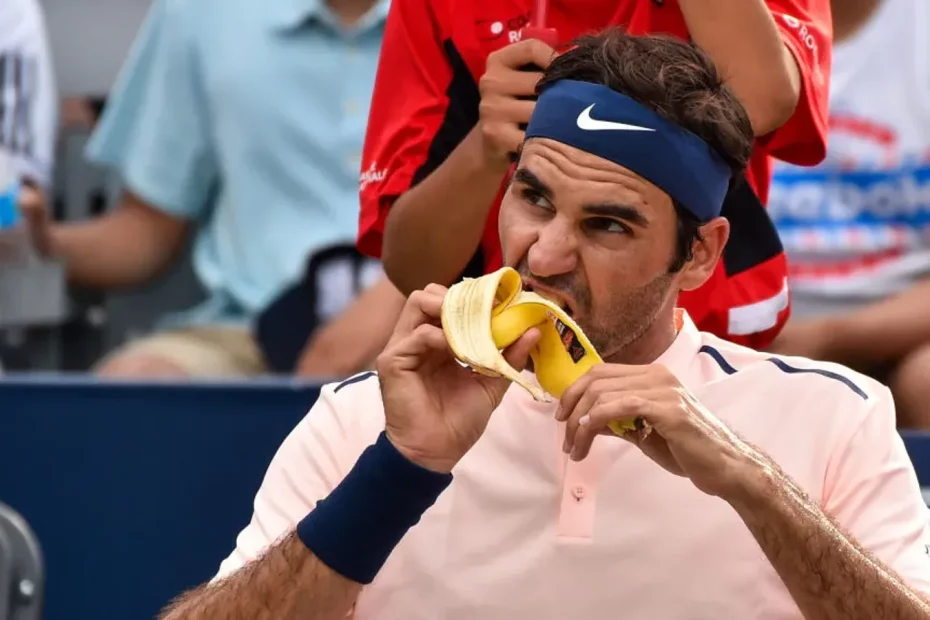Young athletes work hard and put in extra hours of practice for their sport. Proper nutrition should be a regular component of their planned routine in order to optimize that training. A car requires gasoline to function correctly, much as humans (particularly young athletes) require a healthy food regimen. Food contains three macronutrients: fat, carbohydrates, and protein. The ultimate goal of sports nutrition is to balance these macro and micronutrients in order to achieve optimal energy output and, in some cases, body composition for the desired sport. The average inactive individual needs roughly 2–3 liters of water each day. However, depending on perspiration and training, an athlete’s hydration needs can considerably increase. However, hydration is more than just water intake; it is also about electrolyte balance. Before moving further with the topic of What do tennis players eat and drink? Let’s discuss how nutrition plays a big role in everyone’s life.
The above analysis of nutrition applies to each and every activity of a person’s life, wherein he has to put in the extra effort. It may be sports, exercise, or any other physically straining exercise. One such interesting but physically tiring sport is tennis. Players like Rafael Nadal, Serena Williams, Roger Federer, Cristiano Ronaldo, and Lebron James follow a particularly strict diet, which makes them the greatest of all time. we can learn from them the importance of nutrition
Considering the above fact, have you ever wondered what tennis players eat that allows them to push their bodies to their absolute limits for such extended periods of time? Generally, matches are played over a number of sets (generally 2–5 sets), with games lasting up to 2-3 hours for women and 4-5 hours for men. Breaks are short, with players receiving less than a minute between points, 90 seconds for change of ends, and only 2 minutes between sets. Have you ever imagined how a player manages on and off the court?
Step-wise Analysis and its Importance
Training
Athletes must increase their energy and carbohydrate intake. Carbohydrates are required for adequate fuel for both performance and recovery (replenishing stores). Other key components include lean proteins (tuna, chicken, and lean cuts of meat) for muscle regeneration and fruits, vegetables, nuts, seeds, and whole grains for protection and recovery. Athletes will almost certainly be sipping fluids with a bottle at the ready! This is due to the fact that dehydration can impair performance, skill, and decision-making. Warm weather means more sweating and a higher risk of this. Athletes will drink more to replace sweat losses during these days.
Just Before a match – As a Fuel
A carbohydrate-rich lunch with a small quantity of protein and drinks will be consumed 3–4 hours before a match. These carbohydrates will provide a continuous supply of energy to carry you through the bouts later on. Protein is a fantastic addition to any meal, but it is especially important after a match. This might be a chicken and salad sandwich, pasta bolognese, or fruit muesli. Also Read: 5 Weird Rules of Tennis
During a Match – Hydration
Your body requires water to function properly. If your body does not get enough fluids, critical functions such as circulation suffer and your organs do not receive sufficient nutrients, resulting in less efficient performance. Hydration is essential for replacing fluids and preventing dehydration. Ball kids are frequently accessible with fluids and a towel to ensure that hydration is constantly available, whenever required. The match consumes so much energy that glycogen stores (i.e. stored carbs) are depleted. As a result, it is critical to refill these stockpiles. Sportspersons have a tendency to have a sip of water every 15-20 minutes so as to keep themselves active enough.
Post-match Nutrition – Recovery
Athletes should begin recovery as soon as feasible after a game, as the next game is frequently not far away. You must have observed many sportspersons, taking cold showers and consuming a protein-rich diet, as so much energy has been expended, the aim here is to replenish their bodies and get back to the work. Carbohydrates for fuel, protein for muscle repair and recovery, and lots of fluids to replenish losses are included in the die. Fruits and vegetables are also beneficial for their antioxidant capabilities, which help to prevent disease caused by overexertion. Also Read: What is LET in Tennis? It’s Definition, History and FAQ
FAQs related to What tennis players eat & drink?
Ans. Lean proteins (i.e. tuna, chicken, lean cuts of meat) for muscle recovery, and fruits, vegetables, nuts, seeds, and whole grains for protection and recovery are other important components.
Ans. electrolyte-enhanced sports drink.
Ans. Ans. Focus on whole grains, lean proteins, fruits, vegetables, and healthy fats to play at your best.
